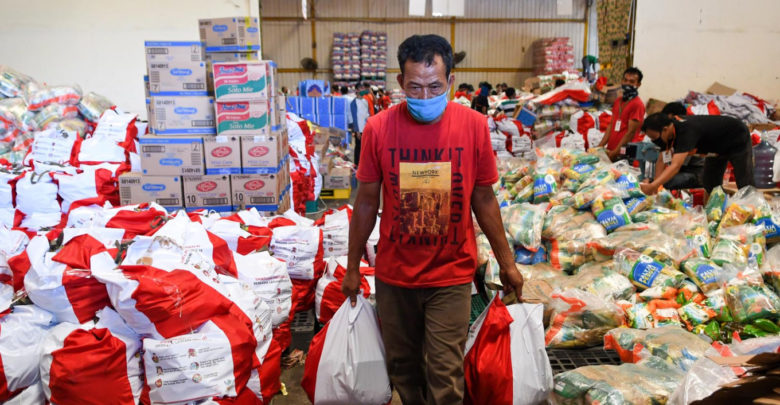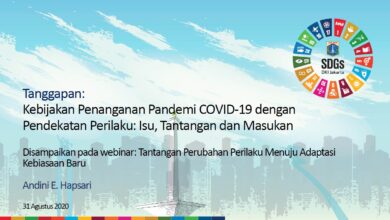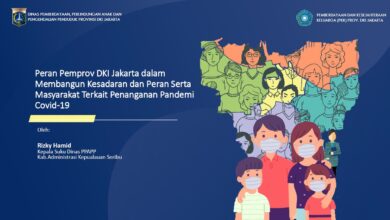
Since Jakarta implemented large-scale social restrictions (PSBB) to curb the spread of COVID-19, 38-year-old Rasmono from Batang, Central Java, has lost his livelihood as a hawker in the Sunda Kelapa area. None of the social aid from the Jakarta administration and the central government has reached him.
“Our neighbors in Kerapu village [in North Jakarta] have received the staple food packages from the President, but not those who are not permanent residents, although we’ve given our data to the neighborhood unit head [RT],” Rasmono told The Jakarta Post.
Massage therapist Nurul Hanafiah has also yet to receive any government assistance, although she and her children are registered for the city-funded Healthy Indonesia Card (KIS) program. Now she is unable to pay her monthly rent for her house in Srengseng Sawah in South Jakarta.
“I need help, but my name isn’t registered, even though I’m a Jakarta resident. My RT does not care about people who live in rented houses,” she said. Nurul has signed up for unemployment benefits and for a training subsidy program, the Preemployment Card, but has yet to receive any cash aid.
Budget and data problems have hampered social aid distribution in the capital city. President Joko “Jokowi” Widodo’s ministers are saying the city does not have a budget for social aid, even though Jakarta Governor Anies Baswedan said he had allocated more than Rp 5 trillion for COVID-19 handling from the “unexpected spending” item in the city’s budget.
Finance Minister Sri Mulyani said she had received a report from Coordinating Human Development and Culture Minister Muhadjir Effendy on Jakarta’s lack of funds to deliver on its promise to distribute social aid to 1.1 million residents.
The central government and the Jakarta administration previously agreed to cover 3.6 million beneficiaries through the city’s social safety nets, of which the central government would take care of 2.5 million.
“The Jakarta administration apparently did not have the funds and asked for central government assistance […]. No, we [the central government] are covering all of those,” Sri Mulyani said in a hearing with House of Representative Commission XI, which oversees finance, on Wednesday.
On top of the budget feud, data problems are resulting in overlapping social aid distribution. Social Affairs Minister Juliari Batubara said residents in at least 15 areas were registered for aid programs of both the ministry and the city administration.
“The initial agreement was not like that. The central administration should only be responsible for those who cannot be covered by the city administration,” said Juliary.
The city administration began distributing staple food packages on April 9, a day before large-scale social restrictions were officially implemented in Jakarta. To date, 1.16 million families have received assistance out of the 1.19 million packages prepared.
On April 20, the central government, through the Social Affairs Ministry, began distributing staple food packaged called “Presidential assistance” to 947,126 households in Jakarta.
The Jakarta administration’s assistant for public welfare, Catur Laswanto, said the social aid prepared by his office did not cover laid-off workers, ojek (motorcycle taxi) drivers, fishermen, bajaj (three-wheeled motorized vehicle) drivers, art performers, houses of worship keepers and urban migrants.
These people, he said, were not initially poor but had been economically devastated by the COVID-19 pandemic. Therefore, the administration had submitted additional data of 2.2 million beneficiaries to the Social Affairs Ministry for the second phase of aid distribution.
“The ministry is still verifying the data. Once the official figures come out, we will continue the distribution. We hope to finish the distribution before Idul Fitri,” Catur said.
Mujiyono, the Jakarta Legislative Council’s head of Commission A overseeing administrative affairs, called on Sri Mulyani to pay off revenue sharing (DBH) to the city administration to help fund its budget.
According to the Democratic Party politician, the Finance Ministry owes the city Rp 7.5 trillion of DBH funds but has only paid Rp 2.56 trillion, while Finance Ministry Regulation No. 36/2020 mandates the acceleration of DBH payments by 50 percent for COVID-19 handling.
Sri Mulyani, however, stated that the central administration should only pay the DBH in August or September of the following year, or after the Supreme Audit Agency’s (BPK) state budget audit.
“What Pak Anies always asked for was the 2019 DBH […]. The BPK will state the tax revenue of the previous year, then we pay according to that figure,” Sri Mulyani said.
akarta Council Deputy Speaker Zita Anjani criticized the feud between the central government and the city administration, noting that problems did not only occur in Jakarta but that other regions also experienced difficulties in social aid distribution.
“Anies asked for central government assistance because he want to help the citizens. This is not a matter of public image anymore. The people need help and the pandemic must pass. There are many things we must do and the costs for it are huge,” the National Mandate Party (PAN) politician said.
Artikel ini telah tayang di thejakartapost.comdengan judul “Social aid feud between central govt, city leaves some poor Jakartans in limbo”, https://www.thejakartapost.com/news/2020/05/08/social-aid-feud-between-central-govt-city-leaves-some-poor-jakartans-in-limbo.html
Penulis : Ghina Ghaliya
Editor : The Jakarta Post
Foto Cover : A worker carries bags of social aid at the Gudang Food Station in Cipinang, Jakarta, on April 22. (Antara/M Risyal Hidayat)



